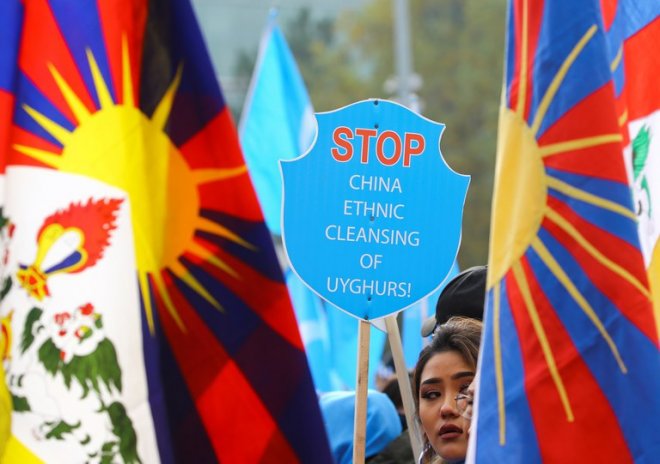China pressures Myanmar to proceed on port project amid community concerns
China is racing to complete a deep sea port project in western Myanmar’s Rakhine state, despite concerns from residents who rely on the area’s waterways and say it will destroy their livelihoods.The Kyaukphyu deep sea port and special economic zone is one of several China-backed megaprojects in Myanmar, along with the New Yangon City urban planning project, the Mee Lin Gyaing Energy Project in Ayeyarwady region and the Letpadaung Copper Mine in Sagaing region.
On May 24, Chinese Ambassador Cheng Hai urged junta Legal Affairs Minister Thidar Oo to speed ahead with the US$1.3 billion special economic zone, which is expected to begin construction following the completion of an environmental and social impact assessment in July.
The zone’s US$7.3 billion-dollar port project will be built in three phases and encompass 370 acres of land on Maday Island and 237 acres on neighboring Ramree Island.
 Local fishermen’s houses and boats at the foreground of the Chinese oil pipeline project building on Maday island, Kyaukpyu township, Rakhine state, Myanmar Oct. 7, 2015. Credit: Soe Zeya Tun/Reuters
Local fishermen’s houses and boats at the foreground of the Chinese oil pipeline project building on Maday island, Kyaukpyu township, Rakhine state, Myanmar Oct. 7, 2015. Credit: Soe Zeya Tun/Reuters
But while Myanmar authorities promise that such projects will bring opportunities to the communities where they are located, residents are less sure. They say the projects will upset their livelihoods while generating cash the junta uses to maintain its grip on power and oppress the people.
Activists have long campaigned for a halt to the deep sea port, saying that the project was started without the consensus of residents and has failed to address the concerns of local fishermen, who say it will impact area fish stocks and cut off access to key bodies of water.
“If the projects proceed, Maday Island residents will not even be able to access the river because of the deep sea ports,” a resident of Kyauktan village on Maday Island told RFA Burmese, speaking on condition of anonymity.
“People who rely on the sea for their livelihoods like us are going to face a lot of trouble then. If they cannot create jobs for us, we are going to face a lot of difficulties.”
Some 70% of Maday’s population of about 3,000 people fish to earn a living.

A fisherman from Maday’s Ywar Ma village, who also declined to be named, echoed concerns about the local fishing industry, which he said “will face major difficulties” because of the project.
“Fishermen like us will definitely go out of business because ships and vessels will be entering the port everyday,” he said. “It would be better if they can provide fishermen with suitable employment such as daily wage-based jobs or skill-based jobs.”
In addition to the port’s potential impact on fishing, the Kyaukphyu special economic zone is expected to force as many as 20,000 people to relocate, according to a report by the International Commission of Jurists.
Tun Kyi, a spokesperson for the Maday Island District Development Association, said that it is not yet known exactly what kind of compensation will be provided for residents adversely affected by the projects.
“There have been discussions between residents and President Myint Thein of the Kyaukphyu special economic zone,” he said. “I asked how they would implement regional development, how they would create job opportunities for our region and how the local residents will fit in their projects, but no one has given specific answers for my questions.”
Key corridor project
The Kyaukphyu deep sea port and zone economic zone are key projects in the 1,700-kilometer (1,000-mile) China-Myanmar Economic Corridor, which will connect the Chinese city of Kunming in Yunnan province to Myanmar’s economic centers of Muse, Mandalay, Yangon and Kyaukphyu.
According to ISP-Myanmar, an independent research group, there are 35 China-Myanmar economic corridor projects to be implemented by China in Myanmar, including railways, motor ways, special economic zones, ports and new city projects.
 Oil tanks at China"s oil pipeline project on Maday island, Kyaukpyu township, Rakhine state Oct. 7, 2015. Credit: Soe Zeya Tun/Reuters
Oil tanks at China"s oil pipeline project on Maday island, Kyaukpyu township, Rakhine state Oct. 7, 2015. Credit: Soe Zeya Tun/Reuters
A local observer of Chinese projects, who did not want to be named for security reasons, said that the Kyaukphyu deep sea port project is critical for landlocked Yunnan province.
“It is a key project … as it will open an outlet to the Indian Ocean,” he said. “But the deep sea port project will not do the work alone. The railways have to be built to connect mainland China to the trade route.”
Than Soe Naing, a political analyst, noted that China has stepped up pressure on the junta to proceed with the project barely two weeks after Cyclone Mocha made landfall in Rakhine with sustained winds reaching over 220 kilometers per hour (137 mph), killing more than 400 people and decimating much of the state.
“China’s communist government has no accountability for democracy and human rights,” he said. “Despite the devastation caused by Cyclone Mocha in Rakhine state, China is solely focusing on the successful implementation of the Kyaukphyu deep sea port project, risking the livelihoods of Myanmar’s people for its own interests.”
Attempts by RFA to contact the Chinese Embassy in Yangon for more details about the project went unanswered Thursday.
Translated by Myo Min Aung. Edited by Joshua Lipes and Malcolm Foster.
[圖擷取自網路,如有疑問請私訊]
|
本篇 |
不想錯過? 請追蹤FB專頁! |
| 喜歡這篇嗎?快分享吧! |
相關文章
AsianNewsCast























